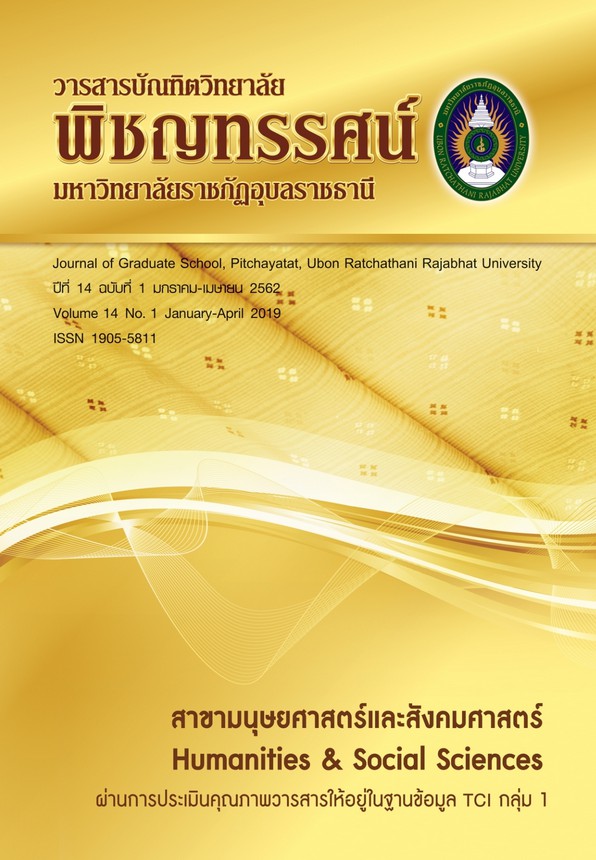การพัฒนารูปแบบการเรียนรู้ที่ส่งเสริมความคิดสร้างสรรค์ ภายใต้สภาพแวดล้อมแบบเปิด สำหรับนักศึกษาปริญญาตรี
คำสำคัญ:
สิ่งแวดล้อมทางการเรียนรู้แบบเปิด, ความคิดสร้างสรรค์, ซินเนคติกส์บทคัดย่อ
การวิจัยครั้งนี้มีวัตถุประสงค์เพื่อ 1) พัฒนารูปแบบการเรียนรู้ที่ส่งเสริมความคิดสร้างสรรค์ภายใต้สภาพแวดล้อมแบบเปิด สำหรับนักศึกษาปริญญาตรี 2) ประเมินรูปแบบการเรียนรู้ที่ส่งเสริมความคิดสร้างสรรค์ภายใต้สภาพแวดล้อมแบบเปิด สำหรับนักศึกษาปริญญาตรี โดยเป็นการวิจัยแบบประสานวิธี กลุ่มตัวอย่างจากการเลือกแบบเจาะจง จำนวน 16 คน ได้แก่ ผู้เชี่ยวชาญด้านการออกแบบการสอน จำนวน 2 คน ผู้เชี่ยวชาญด้านสื่อและนวัตกรรมทางการศึกษา จำนวน 3 คน ผู้เชี่ยวชาญด้านการประเมินจำนวน 3 คน ผู้เชี่ยวชาญด้านกระบวนการคิดสร้างสรรค์ จำนวน 2 คน ผู้ทรงคุณวุฒิด้านสื่อและนวัตกรรมทางการศึกษาจำนวน 3 คน ผู้ทรงคุณวุฒิด้านกระบวนการคิดสร้างสรรค์ จำนวน 3 คน เครื่องมือที่ใช้ในการวิจัย ได้แก่ แบบสัมภาษณ์เชิงลึก แบบประเมิน การวิเคราะห์ข้อมูลและสถิติที่ใช้ ได้แก่ การวิเคราะห์ข้อมูลจากการสัมภาษณ์เชิงลึกแบบมีโครงสร้าง ส่วนการประเมินรูปแบบนำเสนอด้วยค่าเฉลี่ย ส่วนเบี่ยงเบนมาตรฐาน ผลจากการวิจัยพบว่า ความเห็นด้านความเหมาะสมของรูปแบบการเรียนรู้ที่ส่งเสริมความคิดสร้างสรรค์ ภายใต้สภาพแวดล้อมแบบเปิด สำหรับนักศึกษาปริญญาตรี อยู่ในระดับเกณฑ์เหมาะสมมาก
เอกสารอ้างอิง
-----------.คณะกรรมการการศึกษาขั้นพื้นฐาน, สำนักงาน. แนวทางการนำจุดเน้นการพัฒนาผู้เรียน. กรุงเทพฯ: สุรีวิยาสาส์น, 2556.
เลขาธิการสภาการศึกษา, สำนักงาน. ยุทธศาสตร์การผลิตและพัฒนากำลังคนของประเทศในช่วงการปฏิรูปการศึกษาไทยใน ทศวรรษที่สอง พ.ศ. 2552-2561. กรุงเทพฯ: พริกหวานกราฟิก, 2554.
เลขาธิการสภาการศึกษาแห่งชาติ, สำนักงาน. รายงานสรุปการติดตามและประเมินผลการปฏิรูปการศึกษาในวาระครบรอบ 4 ปี ของการประกาศใช้พระราชบัญญัติการศึกษาแห่งชาติ. กรุงเทพฯ: อมรินทร์พริ้นติ้งแอนด์พับลิชชิ่ง, 2553.
อินทิรา พรมพันธุ์. การเรียนการสอนโดยใช้แนวคิดการออกแบบอย่างยั่งยืนสำหรับผู้เรียนในระดับปริญญาตรี. วารสารครุศาสตร์. 44, 4 (ตุลาคม-ธันวาคม 2550): 362.
Casakin and Goldschmidt. Happiness and creativity going with flow. The Futurist, (Online) 2017 (Cite 2018 Sep 23). Available from :http://www.sristi.org/ispe_old/s3_r1_Happiness.pdf
Hannafin, M.J. Open-ended learning environments: Foundations, assumptions, and implications for automated design. R. Tennyson (Ed.), Perspective on automating instructional design. New York : Springer-Verlag, 1995.
Joyce, B. R., & Weil, M. Models of teaching. Boston: Allyn & Bacon, 1996.
McTighe, J. and Seif, E. An implementation framework to support 21st century skills. Bloomington, IN: Solution Tree Press, 2010.
ดาวน์โหลด
เผยแพร่แล้ว
รูปแบบการอ้างอิง
ฉบับ
ประเภทบทความ
สัญญาอนุญาต
บทความทุกเรื่องได้รับการตรวจความถูกต้องทางวิชาการโดยผู้ทรงคุณวุฒิภายนอกอย่างน้อย 3 คน ความคิดเห็นในวารสารพิชญทรรศน์เป็นความคิดเห็นของผู้นิพนธ์มิใช่ความคิดเห็นของผู้จัดทำ จึงมิใช่ความรับผิดชอบของวารสารพิชญทรรศน์ และบทความในวารสารพิชญทรรศน์สงวนสิทธิ์ตามกฎหมายไทย การจะนำไปเผยแพร่ต้องได้รับอนุญาตเป็นลายลักษณ์อักษรจากกองบรรณาธิการ





